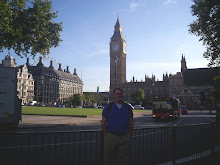The Iowa Legislature is considering a proposal to make an end run around the Electoral Collage. The bill would award Iowa's 7 Electoral votes to whoever won the national popular vote. This measure would not take effect until enough states to equal the required 270 votes also agreed to award their Electoral votes based on the nationwide poplar vote. Currently, New Jersey and Maryland have passed similar laws. The bill is in a Senate committee but it appears to have overwhelming support throughout the legislature.
I find it somewhat odd that the Iowa Legislature is considering such a bill. Under our current electoral system small to mid-size states receive a disproportionate amount of attention. Large states that are comfortably in one party's column tend to not get the attention that a state with a large population should expect to receive. For example, Iowa received not just all the visits during caucus season but both campaigns made swings through the state during the general election.
I applaud the Iowa Legislature for this bill and I am in favor of anything that leads to a direct election of the President.
21 minutes ago

The major shortcoming of the current system of electing the President is that presidential candidates concentrate their attention on a handful of closely divided "battleground" states. 98% of the 2008 campaign events involving a presidential or vice-presidential candidate occurred in just 15 closely divided “battleground” states. Over half (57%) of the events were in just four states (Ohio, Florida, Pennsylvania and Virginia). Similarly, 98% of ad spending took place in these 15 “battleground” states. Similarly, in 2004, candidates concentrated over two-thirds of their money and campaign visits in five states and over 99% of their money in 16 states. Two-thirds of the states and people have been merely spectators to the presidential elections. Candidates have no reason to poll, visit, advertise, organize, campaign, or worry about the voter concerns in states where they are safely ahead or hopelessly behind. The reason for this is the winner-take-all rule enacted by 48 states, under which all of a state's electoral votes are awarded to the candidate who gets the most votes in each separate state.
ReplyDeleteAnother shortcoming of the current system is that a candidate can win the Presidency without winning the most popular votes nationwide. This has occurred in one of every 14 presidential elections.
In the past six decades, there have been six presidential elections in which a shift of a relatively small number of votes in one or two states would have elected (and, of course, in 2000, did elect) a presidential candidate who lost the popular vote nationwide.
The small states are the most disadvantaged of all under the current system of electing the President. Political clout comes from being a closely divided battleground state, not the two-vote bonus.
ReplyDeleteSmall states are almost invariably non-competitive in presidential election. Only 1 of the 13 smallest states are battleground states (and only 5 of the 25 smallest states are battlegrounds).
Of the 13 smallest states, Idaho, Montana, Wyoming, North Dakota, South Dakota, and Alaska regularly vote Republican, and Rhode Island, Delaware, Hawaii, Vermont, Maine, and DC regularly vote Democratic. These 12 states together contain 11 million people. Because of the two electoral-vote bonus that each state receives, the 12 non-competitive small states have 40 electoral votes. However, the two-vote bonus is an entirely illusory advantage to the small states. Ohio has 11 million people and has "only" 20 electoral votes. As we all know, the 11 million people in Ohio are the center of attention in presidential campaigns, while the 11 million people in the 12 non-competitive small states are utterly irrelevant. Nationwide election of the President would make each of the voters in the 12 smallest states as important as an Ohio voter.
The fact that the bonus of two electoral votes is an illusory benefit to the small states has been widely recognized by the small states for some time. In 1966, Delaware led a group of 12 predominantly low-population states (North Dakota, South Dakota, Wyoming, Utah, Arkansas, Kansas, Oklahoma, Iowa, Kentucky, Florida, Pennsylvania) in suing New York in the U.S. Supreme Court, arguing that New York's use of the winner-take-all effectively disenfranchised voters in their states. The Court declined to hear the case (presumably because of the well-established constitutional provision that the manner of awarding electoral votes is exclusively a state decision). Ironically, defendant New York is no longer a battleground state (as it was in the 1960s) and today suffers the very same disenfranchisement as the 12 non-competitive low-population states. A vote in New York is, today, equal to a vote in Wyoming--both are equally worthless and irrelevant in presidential elections.
The concept of a national popular vote for President is far from being politically “radioactive” in small states, because the small states recognize they are the most disadvantaged group of states under the current system.
The National Popular Vote bill already has been approved by a total of seven state legislative chambers in small states, including one house in Maine and both houses in Hawaii, Rhode Island, and Vermont. It has been enacted by Hawaii.